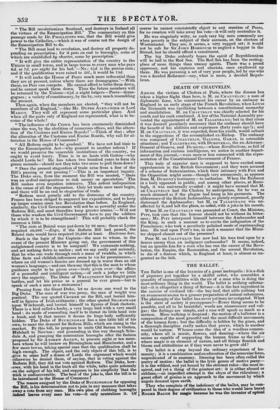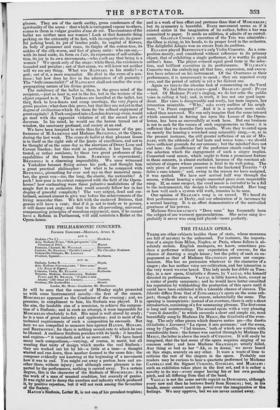THE BALLET.
THE Ballet is one of the luxuries of a great metropolis : it is a dish of piquancy put together by a skilful artist, who assembles a quantity of impossibilities with the air of a man who is doing the most ordinary thing in the world. The ballet is nothing substan- tial—it is altogether a thing of flai-our—it is the last ingredient in the cuisine of civilized life—the bay-leaf, that adds nothing but an evanescent aroma to a grosser preparation of animal substances. The philosophy of the ballet has never yet been investigated. What is the state of society it presupposes ?—Every thing seems to be possible, and all to be beautiful; words are unnecessary and vul- gar; the feeling are simple, and a rose will speak as much as a sermon. Mere walking is despised : the motion of a balleteer is a composition of the most graceful and the most difficult movements of the human form; but the difficulty is hidden by the grace, and a thorough discipline really makes that power, which to another would be torture. Whence came the idea of a wordless commu- nity, where all is music, flowers, and dancing—where the air seems as capable of supporting the human frame as the soil— where magic is an element of nature, and all things flourish and bloom and attitudinize as if they were never to grow old?
The ballet is a step beyond the ordinary experience of hu- manity; it is a combination and an education of the muscular force, unpredicated of in anatomy. Dancing has been often called the poetry of motion: the ballet is the lyric genus of motive poesy— it is the wildest, and yet bound by the stnctest rules—the most in- spired, and yet a thing of the greatest art: it is either absurd or sublime,—an imperfect attempt is the abyss of the ridiculous; a great effort of genius is an approach. to the movement by which angels descend upon earth.
They who complain of the indelicacy of the ballet, may be com- pared in their degree of civilization to those who would have burnt ROGER BACON for magic because he was the inventor of optical
glasses. They are of the earth earthy, gross condensers of the spirituality of the scene : that which is variegated vapour to others, comes to them in vulgar gouttes d'eau de vie. The creatures of the ballet are neither, .men nor women ! Look at that fantastic thing perking on the extremity of its .feet, with its coquette air, its grace- ful jerking bend, its jut of lumber pride, its capital of flowers, its body of gossamer and roses, its thighs Of the cotton-tree, its ankles of the silk-worm, and feet of glassy satin : who can say,— 'with its head aside, its form en l'air, its expression of self-satisfac- tion, its joy in its own movements,—who s!aall say that -being is a woman ? We speak only of the stage : while there, the existence is bounded and peculiar ; out of that arena, we will know not neither will we see any thing. What was RAPHAEL in his studio ?—a god; out of it, a mere sensualist. He died in the arms of a mis- tress ; but how does he live in the admiration of all posterity ? The "belle immortalite r of NAPOLEON shall not confine the ever- propagating nature of his divine genius. The indelicacy of the ballet is, then, in the gross mind of the recipient,—just as heat is, not in the fire, but in the texture of the object exposed to it. The Yankees are horrified at the ballet, but they flock to love-feasts and camp meetings, the very foyers of gross passion : what does this prove, but that they are not yet in that degree of civilization which fits them for the refined enjoyment of great capitals? A Turk conj ured into aLondon drawing-room, would go mad with the apparent violation of all the sacred laws of decorum. In his mind, he would see the harem turned out of window, the sanctuary profaned, and society at an end. We have been tempted to write thus far in honour Of the per- formance of M. SAMENOO and Madame BRUGNOLI, at the Opera, during the last week. The corps de ballet at that pleasant house is in itself on the right side of the iimits of excellence, and not to be thought of on the same day as the abortions of Drury Lane and Covent Garden; but this week in particular, it has been illus- trated, or rather outshone, by these two great professors of the capabilities of the human form. SAME NGO is supernatural; BRUGNOLI is a charming impossibility. We once witnessed a Yorkshire baronet flying across his park, and thought him a great practical philosopher: but what is he compared with BRUGNOLI, pirouetting for ever and aye on that immortal mem- ber, the great TOE—toe, the long, the elastic, the untireable ! A park! how poor is its extent compared with the field of the Opera- house! how enchanting were those pulsative modulations of the magic foot to an orchestra that could scarcely follow her in her display of graceful complicity ! The very catgut, dead and em- balmed, seemed almost to give way before the achievements of the living musCular fibre. We felt with the enslaved Italians, that genius will have a vent; that if it js not to trade or to govern, it will dance and sing ; and that in the all-pervading, universal, compensating principles of mundane enjoyment, man, if he cannot have a Reform in Parliament, will still maintain a Ballet at the Opera-house.




























 Previous page
Previous page